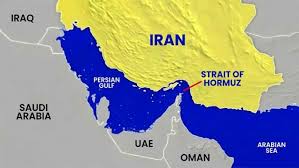Iran’s parliament has approved a decision to close the Strait of Hormuz, a vital maritime chokepoint through which about one-fifth of the world’s daily oil exports pass. This move could trigger serious disruptions in global energy markets and economies worldwide.
If enforced, the closure could halt over $1 billion worth of oil shipments every day and cause oil prices to surge. On Sunday, Brent crude rose nearly 4% to $80 per barrel, while U.S. crude climbed over 4% to $77 per barrel amid mounting tensions.
The decision comes as a retaliatory response to recent U.S. airstrikes targeting Iranian nuclear facilities. The final call rests with Iran’s Supreme National Security Council, which is expected to announce its stance soon, according to state media Press TV.
Esmail Kosari, commander of Iran’s Islamic Revolutionary Guard Corps (IRGC), declared, “This escalation will proceed whenever necessary,” underscoring Tehran’s readiness to act.
The Strait of Hormuz, only 20 miles wide at its narrowest point with shipping lanes less than two miles wide in each direction, connects the Persian Gulf to the Gulf of Oman. It is the main export route for oil-rich Gulf nations like Iran, Iraq, Kuwait, Qatar, Saudi Arabia, and the UAE, making it one of the world’s most strategically sensitive waterways.
Military analysts believe Iran will likely avoid a full naval blockade. Instead, Tehran is expected to use asymmetric tactics such as deploying naval mines and anti-ship missiles launched from mobile coastal batteries capable of striking targets up to 185 miles offshore.
Gregg Roman, executive director of the Middle East Forum, explained, “Iran’s immediate disruptive tools would be naval mines and missile strikes from coastal batteries like the Ghader and Nasir systems.”
The U.S. Navy’s Fifth Fleet and allied forces continue to patrol the region and are prepared to respond firmly to any interference. Blocking international shipping lanes would violate international maritime law and could provoke military action.
Iran’s own economy also relies heavily on the Strait of Hormuz—not only for oil exports but for critical imports. Analysts suggest a closure would backfire economically.
“Such a move would be temporary and self-destructive,” said Roman. “Iran depends on the strait for essential imports and risks provoking a massive U.S. military response.” He added that Tehran may use the threat mainly as diplomatic leverage, as alienating China—the largest buyer of Iranian oil—would be “economic suicide.”
The announcement follows recent U.S. military operations, including the dropping of six GBU-57 “bunker buster” bombs on Iran’s Fordow nuclear facility and other sites, part of Operation Midnight Hammer. This came after an Israeli campaign targeting Iran’s nuclear infrastructure.
Iranian Foreign Minister Abbas Araghchi condemned the strikes as “lawless and criminal,” warning they would have “everlasting consequences.”
The potential closure has sent shockwaves through global markets and governments, particularly in Asia. Countries such as China, India, Japan, and South Korea, which rely heavily on oil shipments through Hormuz, face immediate risks.
While Iran has previously disrupted shipping in the Persian Gulf—such as seizing a U.S.-bound tanker in April 2023—a full closure would mark an unprecedented escalation with far-reaching global implications.
U.S. President Donald Trump praised the damage inflicted on Iran’s nuclear sites as “monumental,” citing satellite images of destroyed underground bunkers and saying the strikes hit “bullseye” targets.
As tensions escalate, Western allies and Gulf states remain on high alert, preparing for potential instability in an already volatile region.




